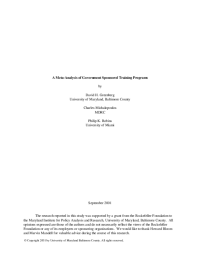A Meta-Analysis of Government Sponsored Training Programs
This study uses meta-analysis, a technique that statistically synthesizes diverse studies, to synthesize the effects of 31 evaluations of 15 voluntary government training programs for the disadvantaged that operated in the United States between 1964 and 1998. The 15 programs were quite diverse. They used different types of training, including structured job search, remedial education, classroom vocational or skills training, on-the-job training (OJT), and subsidized employment in the public or private sector. Some of the programs were national in scope, but others were limited to specific geographical areas. Some were based on random assignment, but other evaluation designs were also used. Meta-analysis provides information that cannot be found in individual evaluations or in other types of syntheses. Syntheses that have not used meta-analysis have focused more on the overall effectiveness of the programs than on the factors that bcause one program to be more effective than another. At best, individual evaluations indicate whether particular programs “worked,” but they provide very limited information on why they were effective, for whom they were most effective, and the economic conditions under which they were most effective. The objective of the research described in the report is to explore which training types are most effective, the sorts of people for whom they are most effective, and the circumstances under which they are most effective.







